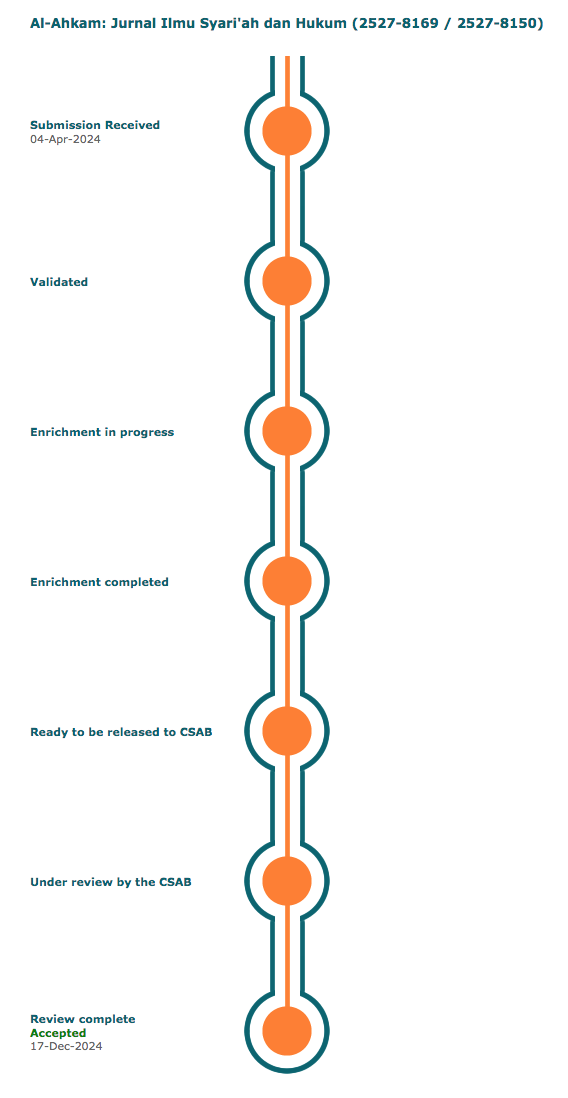Evolution of the Islamic Judicial System: Justice in the Governance of Caliph ‘Umar Ibn Al-Khaṭṭāb
Downloads
Justice in Islamic law has its significance and its inception dates back to the appointment of Prophet Muhammad. From that moment, the Prophet Muhammad assumed the role of the first judge in the Islamic world, overseeing and deciding all cases presented. Following the death of the Prophet, the authority of justice was transitioned to the caliphs. In so doing, the caliphs consistently adhered to the guidance of the Quran, the Sunnah, and Ijma. In addition to them, judges are individuals who possess a deep understanding of the Quran, the Sunnah, and Ijma. Compensation for judges is determined in accordance with regulations set by the caliph. Judges emphasize a commitment to justice in their rulings. The legacy of a just judicial system within the Islamic legal framework continued to thrive through upholding the foundations of the Quranic teachings and the Prophet's traditions.
Downloads
Abdullah, J. (2019). Analisis Putusan Pengadilan Agama Terhadap Cerai Gugat dan Cerai Talak Menurut UU Nomor 1/1974 Tentang Perkawinan dan KHI. YUDISIA : Jurnal Pemikiran Hukum Dan Hukum Islam, 10(2), 183. https://doi.org/10.21043/yudisia.v10i2.5823
Adarudin, S. (2018). ‘Umar Bin Khatab: Alasan Perluasan Wilayah Dan Strategi Politik Dalam Negerinya. Al-Tadabbur, 4(2), 1–15. Retrieved from https://journal.iain-ternate.ac.id/index.php/altadabbur/article/view/96
Adeel, H. M. (2020). Khulafa-e-Rāshidīn and the Prosperity of Religious Minorities: An Analysis. Hamdard Islamicus, 43(1), 73–82. https://doi.org/10.57144/hi.v43i1.37
Al-Daajeh, M. N. M. (2023). Features of the Islamic Navy in the Early Days of Islam. Information Sciences Letters, 12(5), 1801–1812.
Al-Qudsy, S. H. S., & Rahman, A. A. (2011). Effective governance in the era of Caliphate ̀’Umar Ibn Al-Khattab (634-644), 18, 612–624.
Al Husni, A. H. (2018). Eksistentensi Risalah Al-Qadha ‘Umar Bin Khattab dan Relevansinya Dengan Peradilan Agama di Indonesia Pada Era Reformasi. Al-Risalah: Forum Kajian Hukum Dan Sosial Kemasyarakatan, 13(01), 65–89. https://doi.org/10.30631/alrisalah.v13i01.442
Alshawawreh, F. Y. (2023). ’Abd Allah b. ’’Umar b. al-Khattab and His Military and Political Role. An Analytical-Historical Study of His Political and Military Career (Year 3 until Year 73 AH. Jordan Journal for History and Archaeology, 17(1), 96–116. https://doi.org/10.35516/jjha.v17i1.957
Arrasyid, F., Pagar, Tanjung, D., & Mohd Nor, M. R. (2023). The Progressivity of ‘Umar Ibn Al-Khattab’s Ijtihad in Responding to Community Social Changes. Al-Istinbath: Jurnal Hukum Islam, 8(1), 21–36. https://doi.org/10.29240/jhi.v8i1.4872
Ayhan, A. (2022). An Analysis of Legal Realism From the Perspective of Islamic Law. Cumhuriyet Ilahiyat Dergisi, 26(2), 717–741. https://doi.org/10.18505/cuid.1151808
Aziz, M. (2022). Nilai Pendidikan Kepemimpinan Khalifah Abu Bakar Dan ‘Umar. An-Nahdhah: Jurnal Pendidikan, Komunikasi Dan Keagamaan, 4(2), 101–109.
Carr, A. B. (2002). Systematic reviews of the literature: the overview and meta-analysis. Dental Clinics of North America, 46(1), 79–86. https://doi.org/10.1016/S0011-8532(03)00051-X
Eşit, D. (2019). Al-qadi husayn al-marwarrudhi’s understanding of ijma’. Cumhuriyet Dental Journal, 23(2), 609–629. https://doi.org/10.18505/cuid.595668
Fitra, T. R. (2016). Ijtihad ‘Umar Ibn Al-Khaṭṭāb Dalam Perspektif Hukum Progresif. Al-Ahkam, 26(1), 49. https://doi.org/10.21580/ahkam.2016.26.1.705
Fitriani, R., & Aziz, A. (2019). Tinjauan hukum Islam tentang pembebanan mut’ah dan nafkah iddah terhadap suami yang murtad (Studi kasus putusan pengadilan agama nganjuk no: 1830/Pdt.G/2016/PA.Ngj). Samarah, 3(2), 365–377. https://doi.org/10.22373/sjhk.v3i2.5242
Hasballah, K. (2021). Identifying ’Illat through Munasabah in Islamic Law: A Perspective of Imam Al-Ghazali. Samarah, 5(2), 598–618. https://doi.org/10.22373/sjhk.v5i2.10914
Ibrahim, Z. (2015). Pemahaman Kepemimpinan Dalam Islam (Studi Terhadap Biografi ‘Umar Bin Khattab). Ilmiah, VIII(1), 53–61.
Indaturrohmah, F. (2022). Konteks Living Quran Ala ‘Umar Bin Khatab. Revelatia: Jurnal Ilmu Al-Qur`an Dan Tafsir, 3(2), 163–178. https://doi.org/10.19105/revelatia.v3i2.6916
Iqbal, M. (2022a). Concluding Remarks: Qiyās and Contemporary Models of Parallel Reasoning. Logic, Argumentation and Reasoning. https://doi.org/10.1007/978-3-030-91676-3_7
Iqbal, M. (2022b). Dialectical System of Qiyās al-dalāla and Qiyās al-shabah. Logic, Argumentation and Reasoning. https://doi.org/10.1007/978-3-030-91676-3_3
Ishaq, I., & Ridwan, M. (2023). A Study of ‘Umar bin Khatab’s Ijtihad in an Effort to Formulate Islamic Law Reform. Cogent Social Sciences, 9(2), 1–10. https://doi.org/10.1080/23311886.2023.2265522
Kamali, M. H. (2021). History and Jurisprudence of the Maqāṣid: A Critical Appraisal. American Journal of Islam and Society, 38(3), 8–34. https://doi.org/10.35632/ajis.v38i3-4.3110
Lobah, J. (2016). The Islamic Principle of Maslaha as Practical Wisdom for Human Development. In CSR, Sustainability, Ethics and Governance (pp. 145–151). https://doi.org/10.1007/978-3-319-28287-9_11
Malik, A. (2021). Prinsip-Prinsip Peradilan Dalam Risalah Al-Qadha ‘Umar Bin Khattab. Al-Ubudiyah: Jurnal Pendidikan Dan Studi Islam, 2(2), 45–57. https://doi.org/10.55623/au.v2i2.42
Meiloud, A. (2016). A Conflict between Divine texts and Human Legal Needs? Islamic Africa, 7(1), 81–89. https://doi.org/10.1163/21540993-00701006
Muchsin, M. A., & Manan, A. (2019). Historical development of tax during the early islamic period: Jizyah and Kharaj. Journal of Al-Tamaddun, 14(2), 1–7. https://doi.org/10.22452/JAT.vol14no2.1
Opwis, F. (2005). Maslaha in Contemporary Islamic Legal Theory. Islamic Law and Society. https://doi.org/10.1163/1568519054093699
Purkon, A. (2022). Rethinking of Contemporary Islamic Law Methodology: Critical Study of Muhammad Shahrūr’s Thinking on Islamic Law Sources. HTS Teologiese Studies / Theological Studies, 78(4), 1–7. https://doi.org/10.4102/hts.v78i4.7152
Ridwan. (2018). Telaah Pemikiran Hukum Progresif ‘Umar Bin Khatab Perspektif Indonesia. Jurnal Hukum Samudra Keadilan, 13(1), 32–43. https://doi.org/10.33059/jhsk.v13i1.696
Rizwan, S. A. (2022). The Politics of ʿ’Umar b. al-Khaṭṭāb and Zinā-Stoning. Arab Law Quarterly, 1–49. https://doi.org/https://doi.org/10.1163/15730255-bja10103
Selim, M. (2022). Ijma or consensus based decision making and its effects on private and social well being, and economic prosperity. 2022 International Conference on Sustainable Islamic Business and Finance, SIBF 2022. https://doi.org/10.1109/SIBF56821.2022.9939895
Sipayung, A. S. (2022). Maqashid Syari’Ah Sebagai Pendekatan Dalam Hukum Islam. Jurnal Justitia: Jurnal Ilmu Hukum Dan Humaniora, 9(5), 2605–2616. https://doi.org/10.24090/jpa.v23i2.2022.pp247-262
Wiyanto, S. (2018). Corak Berhukum Progresif (Studi Pola Kepemimpinan ‘Umar bin Khattab Relevansinya dengan Hukum Indonesia). UIN Raden Intan Lampung.
Zulfikar, A. (2023). Abu Bakar Al- Siddiq dan ‘Umar Ibn Khattab (Pembentukan Khilafah dan Perkembangan Islam Sebagai Kekuatan Politik). Siyasah: Jurnal Hukum Tata Negara, 6(1), 18–34.
Copyright (c) 2023 Muhamad Amin, Murdiono Murdiono, Renat Sarimov

This work is licensed under a Creative Commons Attribution-ShareAlike 4.0 International License.








